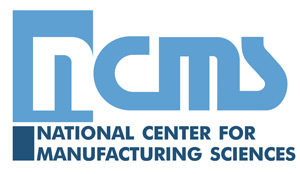NCMS and NIAR pioneer revolutionary KC-135 sustainment program
Ann Arbor, MI—June 26, 2023—The National Center for Manufacturing Sciences (NCMS) and Wichita State University’s National Institute for Aviation Research (NIAR) announce supporting partnerships with the U.S. Transportation Command (USTRANSCOM) and the US Air Force (USAF) Air Mobility Command (AMC) to establish a KC-135 Stratotanker innovation testbed in Wichita.
Earlier this month, a retired KC-135 air refueling aircraft was flown to McConnell Air Force Base and delivered to NIAR to establish the Sustainment Technologies, Research and Automation for Transformative Operations Testbed (STRATO-T).
STRATO-T will be located at Air Capital Flight Line in a stretch of property near McConnell Air Force Base, which includes shared runway access. Beginning in July, STRATO-T will be available for government, industry, and academia to study, develop, and test innovations for reducing legacy aircraft operations costs. STRATO-T will maintain in flight-representative configuration to facilitate ground (non-flying) evaluations and studies of innovative sustainment, energy efficiency, and aircraft automation concepts. Leveraging NIAR’s digital engineering experience throughout these and other studies, STRATO-T will also generate vital KC-135 digital models to improve the long-term supportability of this critical air refueling asset.
STRATO-T leverages the synergistic missions of NIAR, NCMS, AMC, and USTRANSCOM. A Cooperative Research and Development Agreement between USTRANSCOM and NIAR utilizes the KC-135 and NIAR’s expertise in legacy aircraft research to create a unique facility where innovators can test new aviation innovations. A Partnership Intermediary Agreement between USTRANSCOM and NCMS (and similar agreement between NCMS and NIAR) leverages NCMS’s expertise in finding and partnering with technology innovators across the country.
“We applaud the joint efforts of NCMS, USTRANSCOM and AMC for this innovative approach to sustainment for the KC-135 fleet,” said John Tomblin, WSU senior vice president for Industry and Defense Programs and NIAR executive director. “The opportunity for our staff and students to support these efforts with a functional KC-135 is incomparable. We’re confident this program will demonstrate how leading technology can be used to sustain legacy aircraft and pave the way for additional aircraft sustainment programs.”
Acting as USTRANSCOM’s and AMC’s intermediary, NCMS will lead the effort to identify technologies and solution providers that have the potential to significantly improve the sustainment posture of the KC-135 and other aviation assets across the USAF. The development of autonomy technology is a priority for the STRATO-T program. Government, industry, and academic partners will be able to use the aircraft to explore innovation in hardware, software, operations, and maintenance of large military aircraft – with high potential for military/civilian dual technology use.
“STRATO-T will facilitate projects from government, industry, and academic partners that apply and advance technologies such as autonomy, digital engineering, predictive data analysis, and advanced manufacturing,” said Lisa Strama, President and CEO of NCMS. “Projects that harness these technologies have the potential to extend aircraft lifespans. NCMS is honored to collaborate with USTRANSCOM, AMC, and NIAR to establish and develop STRATO-T.”
The selected KC-135 aircraft is approximately 60 years old and otherwise destined for long-term desert storage. It possesses inherent physical/structural and electronic characteristics gained from decades of military service, providing otherwise unobtainable impacts of generations of maintenance, upgrade, environmental exposure, and global operational use. The aircraft’s service life confers artifacts that are highly representative of the condition and performance of other legacy aircraft, resulting in a uniquely realistic environment for test and demonstration of new technologies.
Expected outcomes include successful application of innovative technology, systems integration requirements, and their suitability and value in use. Researchers and innovators will develop and transfer technical information related to extending the useful lifespan of legacy aircraft, modernizing aircraft systems, and exploring innovations in operations and maintenance.
STRATO-T will advance technology readiness levels including aircraft automation, advanced manufacturing, maintenance and repair techniques, and make possible information collection for human system development, predictive maintenance, aircraft threat mitigation, and other uses.
